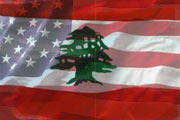Friday, November 18, 2005
The Economist: Lebanon most liberal state in the region
Lebanon came second in the the magazine's Index of Political Freedom, which ranked 20 countries based on "assessments by The Economist's Intelligence Unit across 15 indicators. These included transparency, election of parliament and the head of government, corruption, religious freedom, rule of law, political parties, presence of an opposition and judicial independence. "
"The germ of democracy will spread in a number of less violent Arab countries," it said.
"Lebanon, in particular, will continue to shed Syrian influence and will re-emerge as the most sophisticated and liberal Arab state in the region. "
Watch this space for more quotes from the actual Economist article. In the meantime, here is the list, courtesy of AFP ("The list shows the countries and areas in descending order of perceived political freedom, with 10 a perfect score.")The Palestinian territories and Iraq, "two of the most problematic and volatile places", would take the biggest steps toward democracy in 2006, The Economist predicted. Iraq is due to have elections next month under its new constitution while Palestinians will vote for a new parliament in January. "The Palestinians' election is likely to be the freest and fairest in the Arab world," the magazine reckoned.
Saudi Arabia was ranked at joint 18th, "worryingly, given the world's dependence on its oil supplies," The Economist said, "despite its cautious experiment with municipal elections." Libya (20th) and Syria (joint 18th) were found to have made the least progress. "
1. Israel 8.20
2. Lebanon 6.55
3. Morocco 5.20
4. Iraq 5.05
4. Palestine 5.05
6. Kuwait 4.90
7. Tunisia 4.60
8. Jordan 4.45
8. Qatar 4.45
10. Egypt 4.30
10. Sudan 4.30
10. Yemen 4.30
13. Algeria 4.15
14. Oman 4.00
15. Bahrain 3.85
15. Iran 3.85
17. UAE 3.70
18. Saudi Arabia 2.80
18. Syria 2.80
20. Libya 2.05
To be a WTO member, a country has to agree to have trade with every other WTO member, including nations with which it has no political ties. Gulf Arab states are now joining the WTO and defecting from the Arab League boycott. I was wondering what you think of this?
Saudi Arabia - SAUDI ARABIA - just announced it was ending the boycott.
If you don't believe me, read
http://www.jpost.com/servlet/Satellite?cid=1132053858874&pagename=JPost%2FJPArticle%2FShowFull
So what's going to happen when Lebanon decides to join the WTO?
Itiail
***
Article follows . . .
a move meant to pave the way for its entry into the World Trade Organization (WTO), Saudi Arabia on Tuesday cancelled its economic embargo against Israel, itself a WTO member state.
Under the bylaws of the WTO charter, no member nation may impose an economic embargo on another member state. As a member of the Arab League, Saudi Arabia participated in a joint embargo on Israel for many years, despite its desire to enter the organization. During 12 years of negotiations with the WTO, the Arab nation refused to lift its embargo against Israel - until today.
The Industry, Trade, and Labor Ministry said that in the near future a number of major international electronic, automotive, and foodstuff companies will begin business relationships with Israeli firms as a result of the lifting of the embargo. A spokesperson of the ministry stressed that although the embargo's effects as of late were minimal, the move still represented a major step that would encourage international investment in Israel and increase its exports.
The lifting of the embargo also suggested that Israel and Saudi Arabia would commence business and trade relations.
Head of the foreign trade wing of the Industry, Trade, and Labor Ministry Yair Shiran said that the Saudi decision set an especially important precedent, considering the fact that a number of Arab nations were in the process of acquiring WTO themselves. Any Arab nation wishing to become a WTO member country would unequivocally be required to forego the Arab League's embargo of Israel.
The Saudi decision was the result of its renewed dialogue with the United States in order to gain acceptance into the organization. As part of the newly improved US-Saudi relations, a joint committee was to be formed consisting of both Saudi and American representatives, including US Secretary of State Condoleezza Rice. The committee will convene to discuss military and terror-related issues, as well as economic and energy matters.
Next month Saudi Arabia will be formally accepted into the organization. WTO Director-General Pascal Lamy welcomed Saudi Arabia's entrance, saying, "Today's decision is a historic event for the WTO."
In Iraq ,political haggling is managed by a violent occupation army in what is fast becoming a civil war. I don't see how Tony can argue that political compromise will be institutionalized in that environment.
Bremner wanted to appoint a council and was only forced into an election by Sistani's intransigence.
Iraq is by everyone's estimate a disaster and was totally mismanaged from the start. Israel is only a democracy for half the people under its control.
Itiail, It took the KSA almost a decade to join the WTO . Lebanon may take longer because it will have to reduce its custom duties and make other reforms to open up its markets. Trade is already secretly taking place what is missing is a political settlement.
Issam
<< Home




